Advertisement
Contagion: Trump's Anger, And The Souring Of America's Collective Mood

Recently, I caught myself swearing at an inanimate object. I don’t just mean a quick expletive uttered in frustration — I’m talking about a tirade unleashed on something without eyes, ears or a brain. Fortunately, I was alone, but I recoiled, shocked at my display of anger toward an object I couldn’t get to stand up straight. This wasn’t the first time, either. Over the past few months, I’ve noted with growing concern my disproportionate anger at Boston drivers, lazy students, dismissive doctors — all people who might merit an eye roll or a stern talking to, but who do not deserve my wrath.
When had I gotten so angry, especially when my health, work and relationships were generally going well? And, more important, why was I so angry?
Harnessing anger to galvanize change is one thing, but using it to unleash hatred is another.
It took me a while to figure out the answer: Donald Trump. I’m embarrassed to admit it. I want to ignore this man and his campaign, but I can’t. Every time I go online, pick up a magazine, or look at a television screen, I see his face, twisted in a puckered expression of revulsion for everything and everyone. I can’t escape his rhetoric of hate against Muslims, women, Hispanics, refugees, Democrats, other Republicans. “I hate his face,” I’ve said countless times over the past few months, and it’s true. Simply seeing it makes me angry.
Trump and his supporters are fueled by anger. So are Sanders supporters. We’re all angry, it seems. I share Sanders’ anger toward Wall Street, corrupt campaign practices, the rigged system. Harnessing anger to galvanize change is one thing, but using it to unleash hatred is another. This distinction has thus far separated the Sanders campaign from Trump’s, but in light of recent events in Nevada, the lines may be getting blurry. Has Trump’s venom so poisoned the national dialogue that violence and vitriol have become standard currency? I’m not the only person whose ire is on the upswing.

If I didn’t know he was campaigning for the presidency, I’d assume Trump’s entire goal was to foment anger and hatred. He yells and berates and threatens; he incites violence. He taps into anger that so many of us feel about so many things, and it doesn’t matter what makes us angry — we just need to feel it and express it. Roland Merullo argued recently that Trump’s appeal lies in his ability to exploit our humiliation about the overwhelming struggle so many of us face simply to make ends meet, to exist. That makes sense — people may indeed feel humiliated — and angry — about their lack of upward mobility. The problem is that anger only makes their situation worse, as do the demonstrations of hatred their anger induces.
Rage can spur revolutions. But that’s not what Trump’s campaign has done. Instead, I feel daily waves of the kind of anger that stunts growth and closes minds, my own included. And, I suspect, his campaign makes many of us hate — or think that we hate — one another. Bile rises from my gut when I see primary results, news coverage and various polls indicating his supporters’ hatred. Regardless of its irrationality, I now feel this way when I see a Trump bumper sticker or yard sign. And if social media is any indication, many of us feel similarly, whether we’re anti-Trump or Trump supporters. Declarations of allegiance and opinion, which have always been a hallmark of any election season and a democracy in general, have become invitations for verbal or written warfare, or worse.
Despite my strong feelings about who I want to see win the presidential election, more than anything, I don’t want hatred to be the real victor.
I don’t want to feel this way. I don’t want to be ruled by anger and hate. Angry people aren’t rational people, and irrational people don’t tend to rack up successes. Irrational people also don’t make good presidents. Just as the post-9/11 political climate warped patriotism into xenophobia, Trump has turned his campaign into a weapon of hate, and not just against the other candidates. It’s a weapon he’s teaching us to wield against each other. And while it’s easy to hate him for it, I have to remind myself that that’s precisely the outcome that I — that all of us — should try to avoid. Despite my strong feelings about who I want to see win the presidential election, more than anything, I don’t want hatred to be the real victor.
